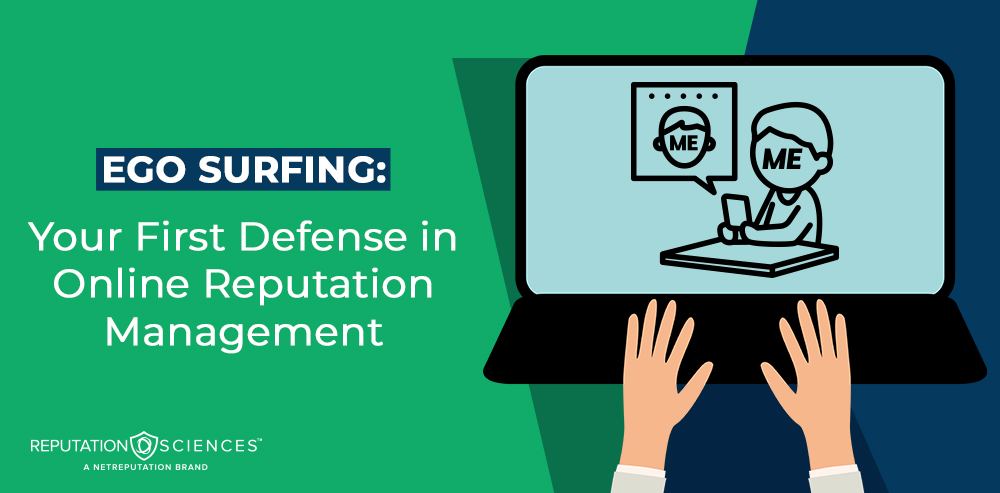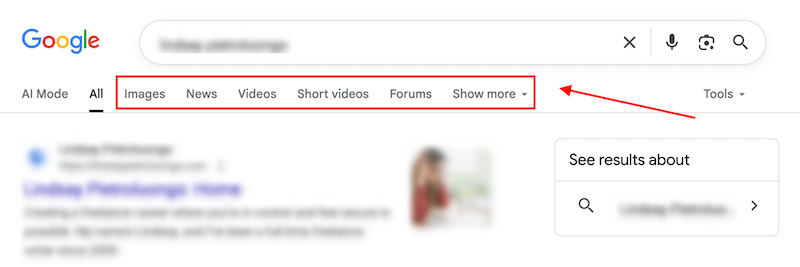Ego Surfing: Your First Defense in Online Reputation Management

Ego surfing — or egosurfing — is when you look for your own name or pseudonym on internet search engines and social networking sites to see the results that come up. And while it may sound like this practice is driven by vanity, it’s actually a sound way to assess and improve your digital reputation.
In the digital age, searching your name on Google, Bing, and other internet search engines is an essential defensive practice. The purpose goes well beyond propping up an individual’s ego. Why? Because the public places a lot of importance on the search results for what they look up.
Plus, vanity searching (another term for egosurfing) may be humbling rather than encouraging. When an unwanted blast from the past pops up online, the repercussions can be harmful to your digital presence.
In this article, we’ll explain the role of vanity searching when working on your digital reputation.
Call us at (844) 458-6735 for an in-depth digital presence audit and valuable insights from an expert.
Name Associations Matter
Search engine algorithms are great for locating names in their massive databases. But when it comes to distinguishing between similar personas online, they can often lead to confusion. That’s potentially damaging to your personal online reputation.
Ensure that the results that pop up for your own name or pseudonym are actually associated with you. This requires you to search beyond surface-level mentions of your name, especially if you have a common name.
You may need to add modifiers, like your location, middle name, or profession. Also, check search results under the news and image categories in addition to the main search results page.
This type of advanced egosurfing can uncover misassociations with others online who have the same name, which need immediate correction.
You can’t rely on the due diligence of others to distinguish errors in the initial Google search. It’s true that interested parties — such as employers and lending institutions — will usually perform a more intensive background check later. But a negative search result can screen you out of that process long before that happens.
Get started today with ORM. Give us a call at (844) 458-6735 to learn more.
No Web Presence Is Worst of All
There’s also the possible scenario that vanity searching produces no results at all for your own name. While most people have some type of web presence, there are those who cherish their online privacy and have intentionally avoided establishing an online presence.
However, having no online personal reputation at all can be just as damaging as having a negative reputation. Maintaining a positive online presence is now paramount in our hyper-communicating world.
Take the world of online dating as an example. Half of all online daters use search engines to learn more about the people they meet online. However, 30% of them opt not to meet up with a person if they find negative information or no information at all about them.
As bad as negative search results are, no online footprint at all might be even worse in the professional world, too. For example, online communication skills are frequently an indicator that a job candidate is knowledgeable and able to thrive in the digital age.
If your name produces no results at all in the initial search, searchers will raise doubts about your ability to use today’s most basic business tool: the internet. Or, the screener may suspect that you’re hiding your digital dirt by using an alias.
Egosurfing is Defensive Googling
In order to address a problem, you’ll first need to be aware that a problem exists. Egosurfing is your ORM radar.
Searching for your own name is the best first step toward personal reputation management. The practice lets you monitor those critical top listings on the first search engine result page (SERP), which are all about you — or at least about someone with the same name, as we discussed earlier.
When someone mentions your name online, tags you in a photo, or retaliates because you’ve unknowingly stepped on their toes in some way, you need to know about it.
The practice of egosurfing is even more essential when we find ourselves at those turning points in life. Buying a new house, leasing an apartment, or making a career move all elicit an online search. All of these turning points bring an increased level of online scrutiny, and burying your head in the sand while hoping for the best is not an option.
Anyone seeking employment, building a professional career, or even beginning new social relationships will benefit from egosurfing. Defensive googling is a must before entering any scenario in which your digital reputation will be the subject of scrutiny. That includes making a career move, buying a house, applying for loans, or launching a startup.
People Are Already Searching For You Online
For many, ORM is even more important than your resume. Recruiters, employers, prospective clients, college admissions administrators, and even that potential match with your significant other all hop online to learn about you first. Add to that list realtors, landlords, investors, and loan officers, and it becomes obvious that maintaining an accurate digital reputation is important for anyone who isn’t living off the grid.
Your Online Footprint Matters
Your online footprint can be the first step toward a rewarding new job. Or, it can be the muddy impression that rules you out as a good fit.
An offhand comment or bawdy image of you on social networking sites might have been funny to your Facebook friends, but it may be totally inappropriate for your future boss to view when it pops up in their initial Google search.
Social networking sites are common sources for negative search results. The wisest candidates are those who ego surf and use defensive Googling to clean up those old muddy footprints before they make a career move. They know any major life change is sure to place them under intensive scrutiny.
Old arrest records, mugshots, and court cases can all appear in search engine databases and affect your personal brand, too. When the source of negativity associated with your name is a third-party person or organization beyond your control, Reputation Sciences™ has the proprietary digital tools you need to be prepared for that scrutiny by placing the reins of search engine rankings in your hands.
Contact us today at (844) 458-6735 to speak with an ORM expert.
Claim Your Name Online
If you haven’t established a positive web presence yet, there are tried-and-true ways to establish and enhance your personal online reputation.
There are many sites that let you set up detailed profiles and begin to create the narrative. For professionals, LinkedIn is an excellent tool for telling the story of you to the public.
Many sites, like LinkedIn and other popular social platforms, frequently rank highly in Google SERPs. To differentiate yourself from others with the same name, add modifiers like your middle name or initial, your location, or your profession.
On other sites beyond social platforms, consider publishing knowledgeable articles. This will highlight your communication skills, show your authority in your niche, and control the online conversation about you.
Don’t Ignore Your Online Reputation
Reliance on search engine results is a double-edged sword.
An established presence enables you to show up first online. It opens the doors to a new career, as well as financial and social opportunities. However, ignoring the effects of a negative online reputation can be disastrous.
Today, most people need to be proactive in the management of their personal reputations online. As reliance on the almighty search engines increases, this is one problem that certainly won’t go away by ignoring it.
If you’ve been repeatedly passed over for jobs, struggled to get past the application process with leasing agreements, or were continuously rejected by lending institutions, it’s time to do some serious egosurfing.
This is your chance to survey the landscape of your online footprint. If your name has been associated with a mugshot of someone who shares your name, for example, you need to know about it immediately.
Egosurfing Is Time Well-Spent
For most people, once they’re aware of a digital reputation problem, they can take action to fix it.
You can clean up your social media posts and delete blog posts and images that are no longer appropriate or helpful. You can increase your web presence if it’s been lacking and use egosurfing to monitor your progress.
These are great first steps to take in your personal reputation management. Just bear in mind that you don’t always have access to the delete button when government databases or other third parties allow access to your personal information.
If a particular comment or inappropriate image associated with your name has gone viral, it will be quite a chore to contact each website administrator to have it removed. And even then, their compliance with your wishes may not happen.
The good news? You can go beyond the basic fundamentals of personal reputation management and call in the experts.
Contact Our ORM Experts Today
At Reputation Sciences™, we have the proven proprietary digital tools that let you take control of the online conversation about you, your business, or your corporation.
When you’re ready to take charge of your online reputation, don’t hesitate to call (844) 458-6735 to speak with an expert.










